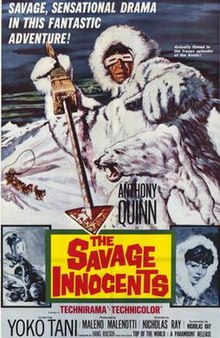|
The Savage Innocents
The Savage Innocents is a 1960 adventure film directed and co-written by Nicholas Ray. Anthony Quinn and Yoko Tani star, with Lee Montague, Marco Guglielmi, Carlo Giustini, Anthony Chinn, and Michael Chow in supporting roles, alongside Peter O' Toole in an early film role. It was adapted from the novel Top of the World by Swiss writer Hans Rüesch. The film was an international co-production, with British, Italian and French interests involved; in the United States it was released by Paramount Pictures. The film was shot on-location in the Canadian Arctic, with interiors shot in Britain's Pinewood Studios and in Rome's Cinecittà studios. It was entered in the 1960 Cannes Film Festival.[1] The film's themes include Inuit survival in the extreme arctic wilderness, as well as their raw existence and struggle to maintain their lifestyle against encroaching civilization. PlotAn Inuk hunter kills a Christian missionary who rejects his traditional offer of food and his wife's company. Pursued by white policemen, the Inuk saves the life of one of them, resulting in a final confrontation in which the surviving cop must decide between his commitment to law enforcement and his gratitude to the Inuk. Cast
ReceptionCriticalEugene Archer gave the film a mixed review in The New York Times upon its 1961 release: "Most of the qualities that have made Nicholas Ray one of America's most highly praised directors abroad while leaving him relatively unpopular and unknown at home are clearly apparent in 'The Savage Innocents.'" Describing the movie as "badly cut" and "a bitter drama," Archer nonetheless found that "Mr. Ray's highly individualistic preoccupation with moral tensions expresses itself in a series of unusually provocative scenes" and concluded that this "strange, disturbing drama will leave most of its viewers dissatisfied and some outraged, but few will remain indifferent."[2] Box officeKine Weekly called it a "money maker" at the British box office in 1960.[3] The Mighty QuinnBob Dylan is widely believed to have written the song "Quinn the Eskimo (The Mighty Quinn)" in tribute to Quinn's performance.[4] References
External links |
||||||||||||||||||||||||||||||||
Portal di Ensiklopedia Dunia
